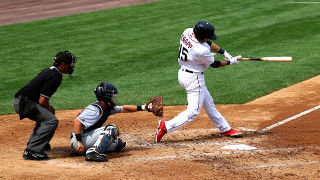Poll Shows Enthusiasm for ’23 MLB Season, Aided in Part by Pitch Clock and Shorter Games; MLB fans favor Pitch Clock by more than 4 to 1.
Thursday, March 30, 2023
MLB fans favor Pitch Clock by more than 4 to 1.

Among the general population, 24 percent say they are more excited for the season compared to 9 percent a year ago. Among sports fans the number jumped from 16 percent to 36 percent, and among avid fans, from 33 percent to 52 percent. Even 47 percent of self-identified MLB fans are also more excited for the 2023 season. (MLB fans are defined as having specified MLB as one of their top or near top sports interests).
These were among the findings of a Seton Hall Sports Poll conducted last week among 1,553 adults across the country. The poll featured a national representative sample from YouGov weighted on U.S. Census Bureau figures for gender, age, ethnicity, education, income and geography and has a margin of error of +/- 2.5 percent.
“Of all the professional sports, Major League Baseball has been the most resistant to change,” said Professor Charles Grantham, Director of the Center for Sport Management within Seton Hall’s Stillman School of Business, which sponsors the Poll. “The MLB Commissioner, the teams, and the MLB Players Association have to be excited with these numbers as the fans, including the diehard MLB fans, are embracing these changes like the pitch clock and larger bases, among others.”
| N=1,553 | General Population | MLB Fan | Non-MLB Fan | Sports Fan* | Non-Fan | Avid Fan | Casual Fan |
| More excited | 24% | 47% | 3% | 36% | 3% | 52% | 29% |
| Neither more excited nor less excited |
65% | 51% | 77% | 55% | 81% | 42% | 61% |
| Less excited | 11% | 2% | 20% | 9% | 16% | 6% | 10% |
| N=1,528 | General Population | Sports Fan* | Non-Fan | Avid Fan | Casual Fan |
| More excited | 9% | 16% | 2% | 33% | 9% |
| Neither more excited nor less excited |
72% | 67% | 78% | 52% | 73% |
| Less excited | 19% | 17% | 20% | 15% | 18% |
Data from the March 2022 Seton Hall Sports Poll
Games Too Long?
The buzz from spring training seems to have spread, even if actual viewership of spring
training games is small compared to regular season games. Whereas as year ago 52 percent
of sports fans thought MLB games were too long, that is already down to 43 percent
this year. Among avid fans, the number who felt the games were too long has fallen
from 61 percent to 54 percent. Interestingly, while self-described MLB fans are in
agreement with sports fans (42 percent), 52 percent of MLB fans still do not believe
that baseball games are too long.
| N=1,553 | General Population |
MLB Fan | Non-MLB Fan | Sports Fan* | Non-Fan | Avid Fan | Casual Fan |
| Yes | 37% | 42% | 32% | 43% | 26% | 54% | 39% |
| No | 38% | 52% | 26% | 44% | 27% | 39% | 46% |
| Don't know/No opinion | 25% | 6% | 42% | 13% | 47% | 7% | 15% |
| N=1,514 | General Population | Sports Fan* | Non-Fan | Avid Fan | Casual Fan |
| Yes | 41% | 52% | 27% | 61% | 47% |
| No | 34% | 37% | 30% | 32% | 41% |
|
Don't know/No opinion |
25% | 11% | 43% | 7% | 12% |
Data from the March 2022 Seton Hall Sports Poll.
Fans Say They Would Watch More if Games Were Shorter
Enthusiasm for the pitch clock and shorter games is borne out by the Poll with 42
percent of sports fans and 57 percent of avid fans indicating they would watch more
MLB if the games were shorter. Only 36 percent and 28 percent respectively said no.
Among MLB fans, 52 percent vs. 31 percent said they will watch more.
| N=1,553 | General Population | MLB Fan | Non-MLB Fan | Sports Fan* | Non-Fan |
Avid |
Casual Fan |
| Yes | 30% | 52% | 10% | 42% | 9% | 57% | 35% |
| No | 46% | 31% | 59% | 36% | 63% | 28% | 40% |
| Don't know/No opinion | 24% | 17% | 31% | 22% | 28% | 15% | 25% |
“Shorter games not only satisfies the viewing public, but extends to the vital advertising partners of Major League Baseball,” said Marketing Professor Daniel Ladik, who is Chief Methodologist for the Poll. “Commercials in the later innings will now likely air before 10PM, which is still a time of high viewership.”
Welcome to the Pitch Clock Era!
The employment of a pitch clock has certainly gotten people talking, and its acceptance
is evident in the poll. While 73 percent of avid fans agree with the use of a clock,
only 11 percent are in disagreement (16 percent neither agree nor disagree). Among
sports fans, 59 percent say they like the clock with 14 percent disagreeing. Among
the general population, 45 percent agree with its use vs. only 15 percent disagreeing
(forty percent neither agree nor disagree). Self-described MLB fans are also largely
in favor (65 percent vs. 15 percent) of the pitch clock.
| N=1,553 | General Population | MLB Fan | Non-MLB Fan | Sports Fan* | Non-Fan | Avid Fan | Casual Fan |
| Agree | 45% | 65% | 28% | 59% | 22% | 73% | 53% |
| Neither agree nor disagree | 40% | 20% | 57% | 27% | 61% | 16% | 32% |
| Disagree | 15% | 15% | 15% | 14% | 17% | 11% | 15% |
Larger Bases?
Another rule change this season is the increase in size of all three infield bases
with the duel goal of player safety (i.e. avoiding collisions) and increased incentive
for exciting base stealing. The numbers in support of this rule change are strong
with 50 percent of sports fans, 60 percent of avid fans and 55 percent of MLB fans
in favor. Only 14 percent, 16 percent and 15 percent respectively disagree with the
larger base rule change, making the proportion of those in favor to those who are
not in excess of 3 to 1. Notably, the 15 inch base size has not changed since the
very beginning of MLB in 1876.
| N=1,553 | General Population | MLB Fan | Non-MLB Fan | Sports Fan* | Non-Fan | Avid Fan | Casual Fan |
| Agree | 39% | 55% | 24% | 50% | 21% | 60% | 45% |
| Neither agree nor disagree | 48% | 30% | 64% | 36% | 68% | 24% | 41% |
| Disagree | 13% | 15% | 12% | 14% | 11% | 16% | 14% |
End of Over Shifts and Other Rule Changes
Other rule changes for 2023 were generally met with approval too. With the exception
of the extra-inning “ghost runner,” changes like limited pick-off throws and the end
of infield defensive shifts met with greater approval than disapproval. The general
population and sports fans disagreed with the runner on second base to start an extra
inning, although avid fans (often considered more of the “purists”), supported the
rule change by 43 percent to 37 percent.
| N=1,553 | General Population | MLB Fan | Non-MLB Fan | Sports Fan* | Non-Fan | Avid Fan | Casual Fan |
| Agree | 34% | 52% | 20% | 46% | 15% | 59% | 40% |
| Neither agree nor disagree | 45% | 23% | 63% | 31% | 67% | 16% | 38% |
| Disagree | 21% | 25% | 17% | 23% | 18% | 25% | 22% |
| N=1,553 | General Population | MLB Fan | Non-MLB Fan | Sports Fan* | Non-Fan | Avid Fan | Casual Fan |
| Agree | 32% | 46% | 18% | 43% | 14% | 55% | 36% |
| Neither agree nor disagree | 45% | 26% | 63% | 31% | 69% | 20% | 36% |
| Disagree | 23% | 28% | 19% | 26% | 17% | 25% | 28% |
| N=1,553 | General Population | MLB Fan | Non-MLB Fan | Sports Fan* | Non-Fan | Avid Fan | Casual Fan |
| Agree | 25% | 38% | 13% | 33% | 11% | 43% | 28% |
| Neither agree nor disagree | 40% | 23% | 55% | 29% | 59% | 20% | 33% |
| Disagree | 35% | 39% | 32% | 38% | 30% | 37% | 39% |
The End of Umpire Calling Balls and Strikes?
Major League Baseball may not be done with rules changes and a possible future change
could involve robotics (i.e. the use of a computer) to call balls and strikes. In
all triple A minor league games this season, the so-called Automatic Balls and Strikes
system (ABS) was approved for use. A majority of MLB fans (52 percent vs. 28 percent)
already approve of this concept. In addition, sports fans (48 percent to 26 percent)
and avid fans (59 percent to 25 percent) also already approve of the use of the ABS
system.
| N=1,553 | General Population | MLB Fan | Non-MLB Fan | Sports Fan* | Non-Fan | Avid Fan | Casual Fan |
| Agree | 37% | 52% | 23% | 48% | 19% | 59% | 44% |
| Neither agree nor disagree | 36% | 20% | 51% | 26% | 53% | 16% | 30% |
| Disagree | 27% | 28% | 26% | 26% | 28% | 25% | 26% |
For more questions, breakdowns and additional charts, please visit the Seton Hall Sports Poll Blog.
Categories: Arts and Culture, Nation and World






